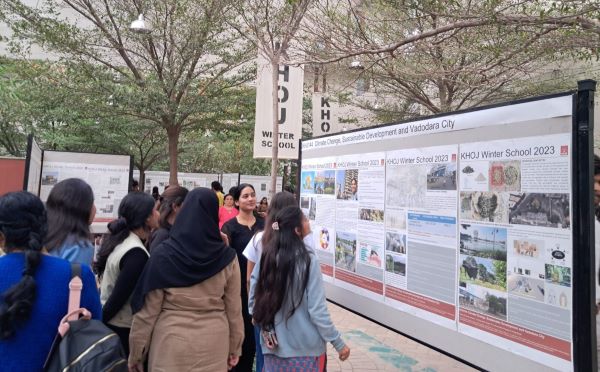Khoj Winter School exhibition, a part of Navrachana University’s interdisciplinary social immersion programme, featuring 29 innovative projects by students, is now open. The exhibition features more than 140 panels and models related to the 29 projects undertaken by over 650 students and professors.
The Khoj Winter School exhibition was inaugurated by Prof. Chetan Vaidya, Independent Director of GIFT City and former Director of the School of Planning and Architecture, New Delhi at Navrachna University’s Vadodara campus in the presence of the University’s management, teachers, and students.
Speaking on the occasion, Prof. Pratyush Shankar, Provost, Navrachana University, said, “At Navrachana University, we believe that learning should not be limited to the classroom. Experience and exposure are the only ways to develop problem-solving and life skills. The Khoj winter school is aimed at providing an enabling environment and opportunities for our students to learn such skills. I am confident that the innovative projects undertaken by the students under the able guidance of their faculty will go a long way in finding solutions to many real-world problems.”
Dr. Prakruti Shah, Head of Khoj Winter School, said, “The projects were carried out in urban and rural areas of Vadodara and covered domains including public health, mental health, hygiene, environment & sustainability, waste management, urban development, economics, social issues. The panels and models displayed at the exhibition showcase the outcome of the projects.”
One of the notable projects undertaken by students as a part of Khoj Winter School 2023 includes assessing the extent of seawater intrusion near the Mahi River basin near Vadodara. The project measured the salinity levels and variations in electrical conductivity and TDS levels at various
locations. Another project studied the effects of social media usage and yoga practices on mental health and sleep quality. It aimed to create awareness about the impact of social media on sleep hygiene and mental health across demographic factors such as age, gender and region. It also established the possibility of yoga practices as an approach to deal with the dependence on social media and its negative impact on the urban and rural population of Vadodara.
Another project explored the impact of flyovers on urban life. It revealed that while flyovers have reduced the travel time for commuters, it has impacted activities occurring at the street level. The project, focusing on the Atal and Fatehgunj flyovers, found that the economy of small businesses on both sides of the flyovers has been affected due to a lack of accessibility and visibility. Similarly, the students found that over-engineered streets have led to vehicle domination, creating unsafe conditions for pedestrians and cyclists. It found that birds have been impacted the most, having lost their habitat due to the loss of trees and redesigning of Chakli Circle, resulting in lowering the height of the birds’ flight, endangering them and people driving on the roads.
Reflecting the wide variety of subjects covered, students also undertook a project on critical
thinking through art integration. The students used 25 paintings along with a photo essay and three sculptures to encourage viewers to think critically about the society and world around them and to develop their own perspectives. A book is also being compiled to convey the idea of critical thinking through art.
The students also mapped biodiversity hotspots in the Vadodara region as a part of another project. They explored natural patterns of the urban landscape to suggest possible indicators to assess the potential of gardens and parks in the city through environment-friendly projects to enhance understanding and appreciation of biodiversity. It incorporated technological advancements such as virtual reality (VR) to recreate the gardens’ historical settings accurately and analyse the monochromatic depictions of the landscape’s characteristics in various types of urban green spaces to evaluate the quality or alteration in their visual appearance.
The Khoj Winter School 2023 exhibition is open until January 17 on the campus of Navrachana University between 9:00 am and 5:00 pm.














